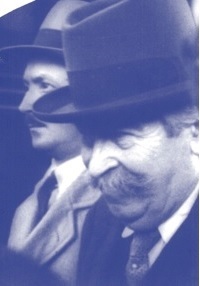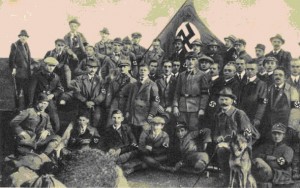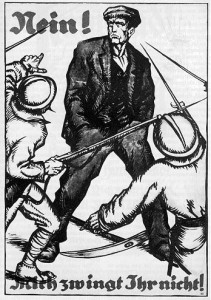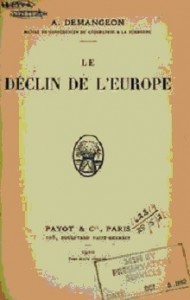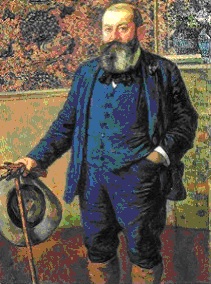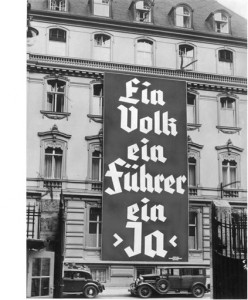The context
A first unfavorable context…
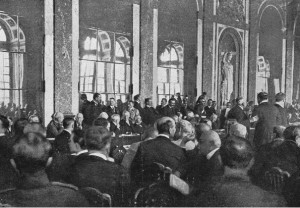 After the First World War, the Treaty of Versailles, signed 28 June 1919 (below against) claimed to draw a new Europe, but it was impossible to achieve because of the conditions that France, including Poincaré, imposed on defeated Germany, the payment of compensation is performed in conditions deemed humiliating by the Germans (hence the strengthening of German nationalism).
After the First World War, the Treaty of Versailles, signed 28 June 1919 (below against) claimed to draw a new Europe, but it was impossible to achieve because of the conditions that France, including Poincaré, imposed on defeated Germany, the payment of compensation is performed in conditions deemed humiliating by the Germans (hence the strengthening of German nationalism).
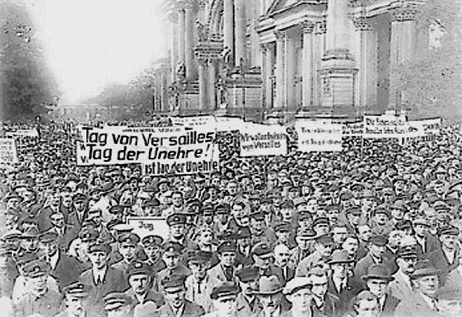 Day of Versailles, Day of dishonor ! (Day of Versailles, Day of dishonor !)
Day of Versailles, Day of dishonor ! (Day of Versailles, Day of dishonor !)
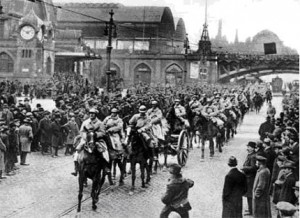
The occupation of the Ruhr decided by the Poincaré government in January 1923 to compel Germany to carry out the provisions of the Treaty of Versailles sparked a deep crisis.
The German population organized passive resistance, the economy collapses. The Anglo-Americans are very critical vis-à-vis the French intransigence.
A gauche, members of the NSDAP ((National Socialist German Workers' Party, 1921).
Right, German poster calling for passive resistance in the Ruhr crisis : No ! I will not force your ! (Not ! I will not submit !).
… then a positive development…
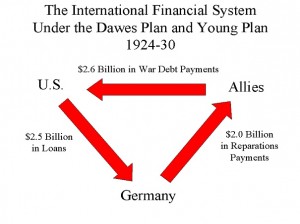 I juillet 1924, la France accepte le plan Dawes fixing the amount of war reparations and allows payment : USA Germany lend the money it owes to the Allies, first and foremost the France, for repairs, and France can repay its debt to the United States.
I juillet 1924, la France accepte le plan Dawes fixing the amount of war reparations and allows payment : USA Germany lend the money it owes to the Allies, first and foremost the France, for repairs, and France can repay its debt to the United States.
The military occupation, source of tensions, who no longer makes sense, the army gradually removes the Ruhr (th 1924 July 1925). Les Locarno Accords, signed by Briand, Chamberlain and Stresemann (th 1925) allow the admission of Germany into the League of Nations the following year. The Treaty of Paris (or Pacte Briand-Kellogg), signed signed 27 août 1928) makes war outlaws. The Nobel Peace Prize is awarded to Dawes and Chamberlain 1925, à Briand a Stresemann one 1926, à Kellogg one 1929.
The Kellogg-Briand Pact had entered into force, the 24 July 1929, when Briand, Geneva, Europe launches the federal idea, Leger throughout the winter developed the Memorandum which lays the foundation, it is subject to European capitals in May 1930.
Many intellectuals are committed to the idea of European union, Paul Valéry especially, which at a given at the University of Zurich conference 1922, considers the Greek cultural heritage, Roman law and Christian unity as the three pillars of Europe, the most active of them count Coudenhove Kalergi, tireless promoter of Paneurope from 1923, and even after the war. Alexis Leger corresponded with Valéry as with Coudenhove-Kalergi.
Some also see in a European Union means for her to be the face of American and Soviet giants, such as geography Albert Demangeon, whose work, The Decline of Europe (1920), will be a great success. The Luxembourg industrial Emile Mayrish play a key role in the negotiations that will lead to the signing of the Convention of the International Agreement Steel, the 30 September 1926 Brussels, by French steelmakers, German (and sarrois compris), Belgian and Luxembourg, ancestor of the European Coal and Steel (CZECH)
Mayrish also brings home, à Colpach, number of French intellectuals, German or from other European countries, to promote the idea of a common European culture. Among them, Walter Rathenau, Karl Jaspers, Ernst Robert Curtius, but several friends and relations Alexis Leger including André Gide, Jacques Rivière, Paul Claudel, Jean Schlumberger et bien sûr, Louise Weiss and Richard Coudenhove-Kalergi.
… followed by a failure
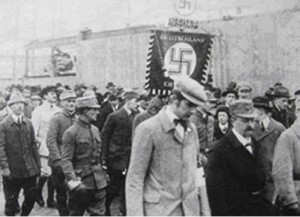 But the removal of the Ruhr, thought of as a goodwill gesture by France, was the occasion of a revival of nationalism and xenophobia in Germany, fueled by a young party, le NSDAP (photo-cons, Munich, 1923).
But the removal of the Ruhr, thought of as a goodwill gesture by France, was the occasion of a revival of nationalism and xenophobia in Germany, fueled by a young party, le NSDAP (photo-cons, Munich, 1923).
Gustav Stresemann, l'allemand-makers and the Briand Allemagne, dies 3 th 1929, Emile Mayrisch the previous year, in a car accident.
Le crash Boursier New York (24-29 th 1929) marks the beginning of a great depression and the greatest economic crisis of the twentieth century. In particular, it destabilizes the German economic policies, Young le plan (he replaced the Dawes Plan in June 1929) causes the abrupt withdrawal of American capital of Germany, thus to some extent the rise to power of the NSDAP.
The National Socialists get some success in regional elections 1929, but the general elections in September 1930, they get 6,4 million votes and won 107 seats Reichstag (German Parliament).
Below against, Munich, 1933.
End 1930, the League of Nations listening to the report of the Briand Memorandum, each expressed, approves more or less, expresses reservations, a commission is created, It will meet 6 time. Without reaching.
It will not resume after the war idea but on a new basis, more economic and political.


